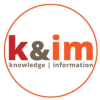|
In today’s climate, organisations of all sizes and types must capitalise on the information and knowledge they either possess or can obtain if they are to thrive and survive. This requires an effective knowledge and information management framework which embraces leadership, culture, processes, systems and skills. The framework must support the exploitation of information and data, and the tacit knowledge represented in the skills, experience, and insight of their staff and the teams and communities in which they work, share and learn. It must also recognise the importance of the information and knowledge gained through the many partnerships and collaborations in which organisations now routinely engage, including those with their customers and clients.
What is information management?
Where data and information can be recorded or are generated automatically, the disciplines of information management can be applied – to collect, organise, structure, store, manage, and deliver access to data and
information so that it can be re-used, analysed, and adapted. Tacit knowledge can to a degree be captured in standards, procedures, techniques and training thus treating it as information and protecting it from
loss as organisations restructure and experts move.
How is knowledge management different?
However, to ensure that tacit knowledge i.e. the know-how, experience and expertise of individuals which can’t sensibly be documented, is accessible, shared and mobilised, requires different and social approaches:
connecting people and teams, fostering the capability of the organisation and its staff to learn from experience, building learning techniques into organisational processes and ensuring a social and learning
culture which fosters knowledge re-use, problem-solving and the innovation and improvement which the organisation needs.
Knowledge and information management approaches are different but must be recognised as needing to be closely intertwined if organisations are to reap the full benefit from their data, information and knowledge assets. This is the stimulus for CILIP’s Knowledge and Information Management Special Interest Group (K&IM).
The Knowledge & Information Management Special Interest Group (K&IM) is for anyone who is working in, or interested in, Knowledge Management and/or Information Management.
We also aim to collaborate and engage with all other CILIP special interest groups who wish to contribute to this agenda - especially Government Information Group (GIG),
UK eInformation Group (UKeIG), Health Libraries Group (HLG) and
The Commercial, Legal & Scientific Information Group (CLSIG).
|

 K&IM About Us
K&IM About Us
